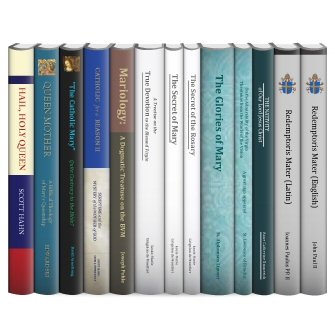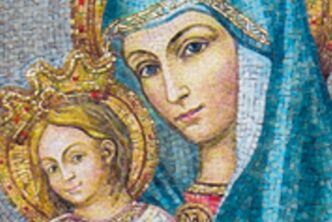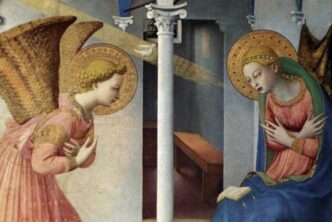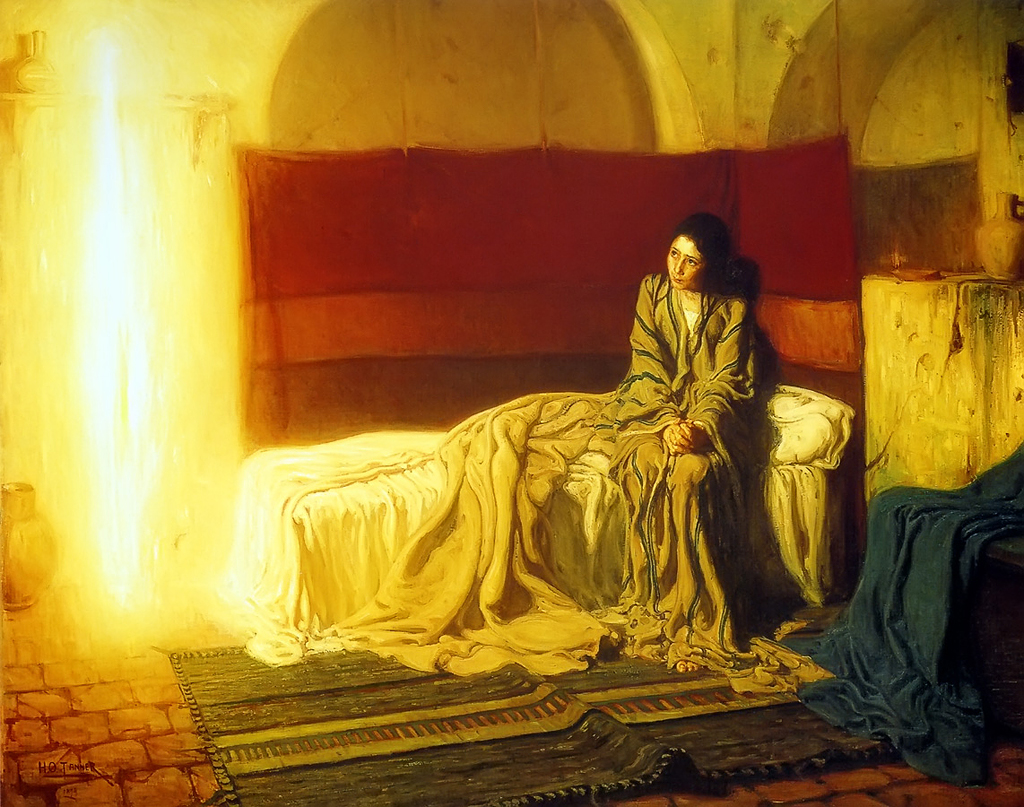This post is by guest Brandon Ruphohn, Marketing Copywriter at Logos.
 It’s the Feast of the Assumption! On this special day, we’re excited to announce our newest collection: the Catholic Mariology Collection (13 vols.), containing some of our most recently-shipped volumes on Mary and the subject of Mariology within a Catholic context.
It’s the Feast of the Assumption! On this special day, we’re excited to announce our newest collection: the Catholic Mariology Collection (13 vols.), containing some of our most recently-shipped volumes on Mary and the subject of Mariology within a Catholic context.
But why is the Assumption of Mary important for Catholics?
The Marian doctrines don’t appear in the Nicene or Apostles’ Creeds, so our faith is not quite as dependent upon them as, for example, Jesus’ resurrection or the apostolicity of the Church. However, Marian doctrines are by no means optional or frivolous: they help us understand Christ and our relationship with him.
Mary plays a unique role in our understanding of Christ. Being his mother, she must have known him intimately, personally, and spiritually. As a loving and dedicated Jewish woman, Mary raised Jesus in obedience to God and to the Torah (Luke 2:21-24, 39-41), and was rewarded with a holy and devout son. Luke recounts that she “kept all these things in her heart” (2:51). Mary was what Christians today aspire to be: to be among those who truly know Jesus intimately, personally, spiritually.
Paul, on the other hand, knew Jesus as a flash of light (Acts 9:3, Galatians 1:12). After his dramatic conversion experience, in which he was knocked off his horse and temporarily blinded, Paul probably spent several years in the desert of Arabia (Galatians 1:17-18), where he wrestled the implications of his encounter with the living person of Jesus. He had to re-evaluate Jewish theology, the Torah, and the Prophets, all of which he had loved so dearly and so legalistically. His experience with Jesus—though brief—was enough for him to dedicate the rest of his life in love of Christ.

Regarding the Feast of the Assumption, it would appear that both Mary and Paul have the same hope to share with us. Pope Emeritus Benedict XVI explains the significance of the Assumption:
Mary’s Assumption body and soul into heaven is for us a sign of sure hope, for it shows us, on our pilgrimage through time, the eschatological goal of which the sacrament of the Eucharist enables us even now to have a foretaste.
(Sacramentum Caritatis 33)

Pope Benedict also illuminates today’s New Testament reading in his apostolic exhortation on the Eucharist. The source and summit of our Catholic lives, the Eucharist provides a foretaste to the sanctified life ahead of us—that which Mary had already achieved through Christ’s merits. Paul refers to this life in today’s reading from 1 Corinthians:“In Christ shall all be brought to life, but each one in proper order: Christ the firstfruits; then, at his coming, those who belong to Christ” (1 Corinthians 15:22–23).
Barely four chapters earlier in the same letter, Paul reveals that it was Christ who taught him the institution of the Eucharist (1 Corinthians 11:23). He reminds us that the Eucharist is a serious matter for the church, that “whoever eat the bread or drinks the cup unworthily will have to answer for the body and the blood of the Lord” (1 Corinthians 11:27). Here, we are reminded to examine ourselves, for “as often as you eat this bread and drink the cup, you proclaim the death of the Lord until he comes” and so, we look forward to his coming again!
For just as Mary’s Assumption raises our eyes towards heaven, so too do we look to heaven to catch of glimpse of Jesus coming back down (1 Thessalonians 4:16). Until then, we proclaim Christ’s crucifixion. “For I resolved to know nothing while I was with you except Jesus Christ, and him crucified,” says Paul (1 Corinthians 2:2). Paul resolved to know Christ crucified. To know Christ as Mary did during her 30 years with him—tragically culminating at the foot of the cross—or as Paul did through his conversion experience, is to know Jesus through his Paschal sacrifice.
The Eucharist is where we find a Christ we can know intimately, personally, and spiritually. As St. St. Louis de Montfort (included in the new Catholic Mariology Collection) recommends to us, “When Mass is over, make a short thanksgiving.… Then leave the church, as if you were going down from Calvary.” Both Mary and Paul direct us to Christ upon the Cross as a means of knowing who Christ truly is.






I don’t understand how the set is advertised as 13 vol. but only 7 were downloaded after full purchase price was paid. Would someone care to enlighten me?
Thanks,
Fern
Fern,
Thanks for asking. It looks like you already owned some of the titles, so the purchase price you saw was customized for you. Normally the collection would cost $139.95. We discounted it to $104.95. You paid less than that because you already owned six of the titles. That’s also why you only had to download seven of them.
I hope that makes sense. Feel free to call us at 877-542-7664 if you have further questions or concerns with your order.
Thank you Alex.
Eventually I will learn how all of this works. 🙂
Thank you for your patience!!
Fern